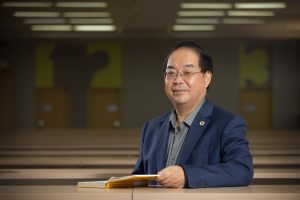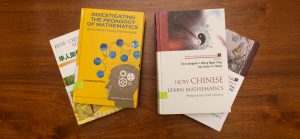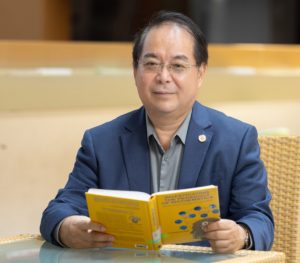Fan Lianghuo is internationally recognised as the first scholar to transform the concepts of ‘teachers’ pedagogical knowledge’ and ‘textbook research’ into rigorous academic disciplines. His pioneering work has profoundly shaped both the theoretical frameworks and practical approaches to teacher professional development on a global scale. As chair professor of education and dean of the Faculty of Education (FED) at the University of Macau (UM), Prof Fan is dedicated to the mission of ‘strengthening the education system through teacher excellence’. He incorporates this vision into modern educational practices to drive innovative advancements in educational research and teacher development.
Enhancing Teacher Competence Through Academic Research
‘Teacher competence forms the foundation of quality education, shaping students’ development and the future of society,’ says Prof Fan—a belief that has guided his nearly forty-year academic career. Over the years, he has held positions at some of the world’s most prestigious universities, including the University of Chicago, Nanyang Technological University, the University of Southampton, and East China Normal University. His work in both teaching and research has consistently centred on one key question: How can teachers become truly effective in guiding student development? Through years of relentless effort, Prof Fan has reached numerous milestones in education, earning global recognition as one of the most influential Chinese mathematics educators.
Prof Fan’s deep commitment to enhancing teacher quality drives not only his research, but also his leadership as dean of FED, a role he has held since 2024. Whether addressing traditional curriculum reforms or exploring cutting-edge areas like artificial intelligence (AI) in education, his ultimate goal remains the same: to equip future teachers with the knowledge and skills to better understand education and make a meaningful impact as educators.
Establishing a Research Paradigm for Teacher’s Pedagogical Knowledge
‘How do teachers enrich and develop their pedagogical knowledge?’ This fundamental question marked the start of Prof Fan’s research journey. In 1993, while pursuing his PhD in education at the University of Chicago, he identified a critical gap in the field. While the importance of teachers’ pedagogical knowledge for effective teaching was widely acknowledged in the American education community, little systematic research had been conducted on how this knowledge was acquired, developed, and accumulated over the course of a teacher’s career. This realisation became the foundation of Prof Fan’s PhD dissertation.
Pedagogical knowledge refers to the understanding, skills, and strategies teachers need to teach effectively. Prof Fan viewed the acquisition of this knowledge as a systematic process. To address the gap, he created the first rigorous analytical framework for studying pedagogical knowledge, transforming vague, anecdotal ideas into concepts that could be tested through empirical research. His research initially focused on high school mathematics teachers in the Chicago metropolitan area, examining how they built and expanded their pedagogical knowledge over time. Later, during his time at Nanyang Technological University, he broadened the scope of his research to include secondary school teachers in Singapore. By systematically tracking and comparing teachers’ experiences across contexts, Prof Fan reached a groundbreaking conclusion: among the various means by which teachers develop pedagogical knowledge, their teaching experience and reflection hold the most significant influence, far surpassing pre-service training or reading professional journals.
This finding challenged long-held assumptions about the pathways to teacher professional development. Rather than relying solely on textbooks or standardised training programmes, Prof Fan found that reflective teaching practices allow teachers to develop strategies tailored to their unique classroom environments. He explains, ‘For example, when students struggle to understand a concept, simply applying standard methods often won’t solve the issue. However, by systematically reflecting on the relationship between instructional design and student responses, teachers can create new pedagogical knowledge.’ According to Prof Fan, this process of generating knowledge through reflective practice is essential for teacher professional development.
Prof Fan’s findings were first published in an international journal and later expanded into a widely recognised monograph, available in both Chinese and English. The Chinese edition, A Study on the Development of Teachers’ Pedagogical Knowledge, has been cited over 1,800 times by scholars in the Chinese mainland since its publication in 2003, becoming a classic work in educational literature. The English edition, Investigating the Pedagogy of Mathematics: How Do Teachers Develop Their Knowledge?, has achieved global recognition as a key resource for understanding teacher professional development. It provides educators, teacher trainers, school administrators, researchers, and policymakers with both a theoretical framework and practical insights.
Defining Textbook Research as an Academic Discipline
In addition to his groundbreaking work on teachers’ pedagogical knowledge, Prof Fan has made significant contributions to ‘textbook research’ by defining it as an academic discipline and reshaping the way it is studied. In the 1990s, he observed that international research on textbooks was still in its early stages. Most studies at the time focused narrowly on textbook analysis, primarily examining how knowledge was structured and organised, while overlooking broader contextual factors. Recognising this limitation, Prof Fan proposed a more comprehensive approach to textbook research. He argued that it should expand beyond the analysis of textbook content to explore the formation and evolution of textbooks, the influence of sociocultural and political-economic factors on educational content, and the ways textbooks, as a teaching tool, shape teachers’ practices, student learning outcomes, and even the values and morals of future generations. Reflecting on this turning point, Prof Fan says, ‘After this definition was established, the approaches to studying textbooks became significantly clearer.’
To apply this theoretical framework, Prof Fan focused his research on mathematics textbooks, particularly to better understand the internationally recognised success of Chinese mathematics education. As chief editor, he published How Chinese Learn Mathematics: Perspectives from Insiders in 2004, followed by its companion volume How Chinese Teach Mathematics: Perspectives from Insiders. These two monographs systematically examine the factors contributing to the effectiveness of mathematics teaching and learning in Chinese communities, highlighting the design and role of textbooks as critical factors. Together, these volumes are widely regarded as significant milestones in mathematics education research, demonstrating how textbook studies can yield valuable insights when examined through the lens of specific disciplines and cultural contexts.
To further advance this area of study, Prof Fan founded the International Conference on Mathematical Textbook Research and Development, a global platform for exchanges and collaboration in the field. Over the years, the conference has grown into a leading event in mathematics textbook research. This achievement has solidified Prof Fan’s reputation as a key founder of the international mathematics textbook research community. Building on this success, he is now bringing this global dialogue to Macao. In 2027, the 6th International Conference on Mathematical Textbook Research and Development will be hosted at UM. Through this initiative, Prof Fan aims to drive innovation in mathematics textbook research and use international insights to address local challenges. His ultimate goal is to optimise textbook design and enhance the quality of education in Macao.
Making Teachers’ AI Literacy a Priority in the Faculty Development Plan
Prof Fan, now just over a year into his role as dean of FED, has developed a five-year development plan for the faculty. The plan aims to advance educational innovation and enhance teacher training. Confident in the faculty’s current standing, he notes, ‘The faculty is on a strong track.’ FED’s strengths are evident in its outstanding faculty, high-quality teacher training programmes, and dedicated educational research centres. These assets have helped position UM in the 126–150 range in the 2025 Times Higher Education World University Rankings by Subject for Education. In addition, the university has risen to 15th place in the 2025/2026 U.S. News & World Report Best Universities ranking for Education and Educational Research.
Building on this strong foundation, Prof Fan envisions transforming FED into a world-class hub for teacher training. As technology becomes increasingly integrated into higher education globally, he has identified AI as a key driver of educational transformation. Strengthening teachers’ AI literacy, therefore, is a central pillar of the five-year plan. To this end, Prof Fan has initiated the establishment of the Centre for STEM and AI Education. The centre will focus on cutting-edge research into practical AI applications and best practices for integrating technology into education. ‘This will help educators stay ahead of the curve and master emerging technologies, enabling AI to be a valuable assistant for teachers,’ Prof Fan explains.
Establishing FED as a Hub for Nurturing High-Quality Teachers
‘However ambitious an educational vision is, it won’t succeed without high-quality teachers,’ says Prof Fan. He highlights the importance of teacher education, noting that teachers’ personal charisma, values, and even their everyday actions play a quiet but powerful role in shaping students’ worldviews, perspectives on life, and core values. As dean of FED, Prof Fan is dedicated to establishing the faculty as a hub for nurturing high-quality teachers. His strategy focuses on rigorous academic training, the cultivation of professional ethics, and practical experience. This comprehensive approach ensures that future educators are not only knowledgeable and skilled but also compassionate, empathetic, and deeply invested in student growth. This vision is central to the faculty’s mission and reflects Prof Fan’s deep commitment to advancing education.
About Prof Fan Lianghuo
Prof Fan Lianghuo is chair professor of education and dean of the Faculty of Education, as well as director of the Centre for STEM and AI Education at the University of Macau. He also holds an emeritus professorship at the Southampton Education School, University of Southampton, UK. His research interests include curriculum studies and textbook research in mathematics, teacher professional development, mathematics teaching, learning and assessment, international and comparative education, AI in mathematics education, and algorithms for polynomial division in pure mathematics. Prof Fan’s book, A Study on the Development of Teachers’ Pedagogical Knowledge, is widely regarded as one of the most influential academic works in contemporary pedagogy. In the field of basic mathematics, his research addressed a long-standing misconception in traditional university and high school mathematics textbooks—that synthetic division cannot be generalised. He established a new and fundamental polynomial division theorem, which has had a significant impact on the field. One of his key articles on this subject has been downloaded 17,154 times from the University of Southampton’s institutional research repository, making it one of the most accessed works in pure mathematics. In textbook development, Prof Fan has served as editor-in-chief for mathematics textbooks in Singapore, the UK, and China. He also played a key role in the Sino-British collaboration on the UK edition of the textbook One Lesson One Exercise, contributing significantly to the internationalisation of Chinese mathematics education.
Text: Kelvin U
Photo: Jack Ho, with some provided by the interviewee
English Translation: Bess Che
Source: UMagazine Issue 32

Prof Fan Lianghuo

Prof Fan is the author and editor of numerous academic publications

Prof Fan has developed a five-year development plan for the Faculty of Education
排名中躍升至第-15-位--300x200.jpg)
UM has risen to 15th place in the 2025/2026 U.S. News & World Report Best Universities ranking for Education and Educational Research

